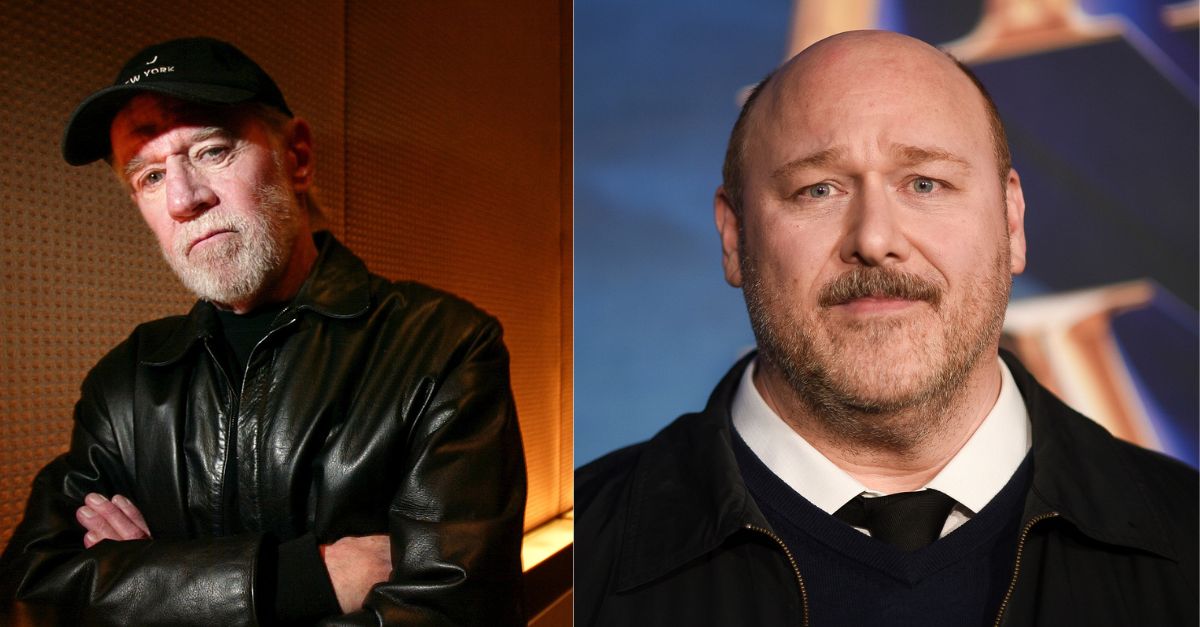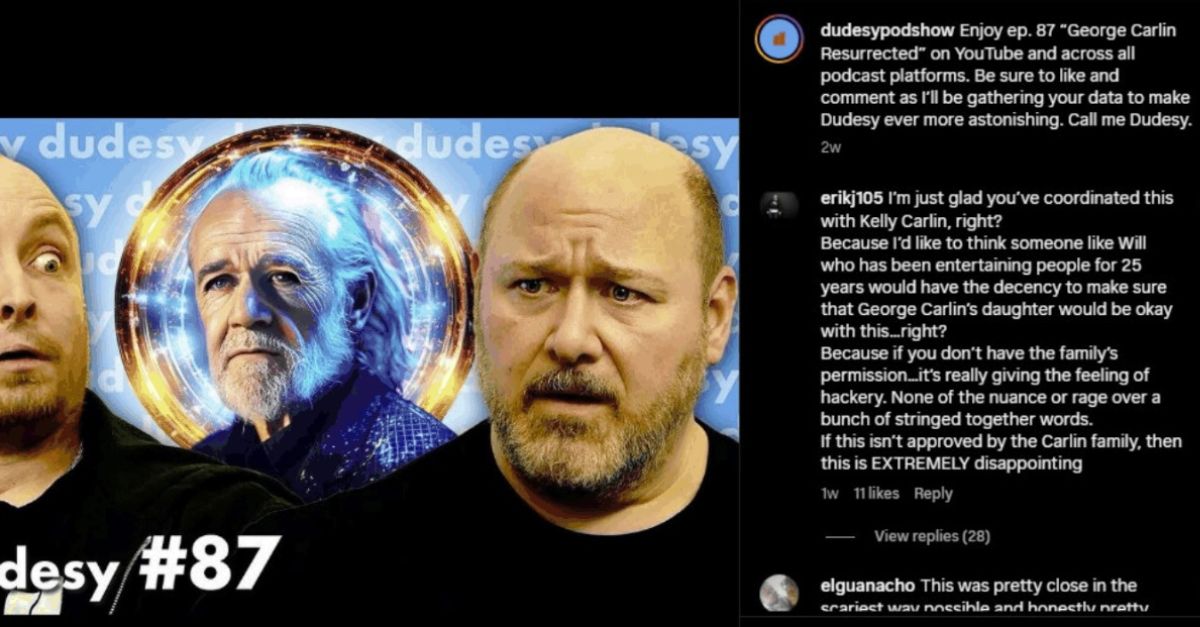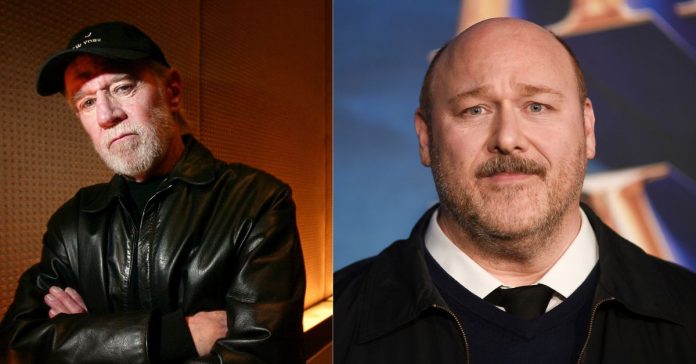
Left: his March 19, 2004 file photo shows actor and comedian George Carlin in New York. Carlin is featured in CNN’s docuseries, “The History of Comedy,” premiering Thursday at 10 p.m. EST. (AP Photo/Gregory Bull, File)/Right:Will Sasso arrives at the premiere of “History of the World, Part II” on Monday, Feb. 27, 2023, at Hollywood Legion Theater in Los Angeles. (Photo by Richard Shotwell/Invision/AP)
In a witty critique of modern society known as the ‘Ode to the Modern Man,’ George Carlin proclaimed he knew the “downside of upgrading” and that he was a “high-tech lowlife” who could give you a “gigabyte in a nanosecond.”
Twenty years later and years after his death, an online special featuring the legendary comedian’s voice and jokes transmogrified through those most modern means, artificial intelligence, has triggered a lawsuit from the American icon’s estate.
Reviewed by Law&Crime on Friday, the 23-page lawsuit filed in a California court was brought against Dudesy, a media company and podcast purportedly run by AI and hosted by Will Sasso and Chad Kultgen. The podcast published a video on YouTube on Jan. 9 titled “George Carlin: I’m Glad I’m Dead,” featuring a rendering of Carlin’s voice to tell jokes based on his work “subject matter” that Dudsey thought might interest him, and according to the video itself, uses the late comedian’s “cadence and attitude.”
The video, which is still up on YouTube, violates Carlin’s copyrighted works, according to attorneys for his estate.
“Defendants took it upon themselves to ‘resurrect’ Carlin with the aid of [AI],” the complaint states, alleging Sasso, Kultgen and at least 20 unnamed John Does “created a fake script for a fake George Carlin comedy special and generated a sound-alike of George Carlin to ‘perform’ the generated script.”
No one had permission to use Carlin’s likeness for the program, the lawsuit continues.
“It is not a creative work. It is a piece of computer-generated click-bait which detracts from the value of Carlin’s comedic works and harms his reputation. It is a casual theft of a great American artist’s work,” estate lawyers wrote. “In addition to the immediate infringement, defendant’s AI-generated ‘George Carlin Special’ may also deter younger audiences who are unfamiliar with George Carlin from engaging with his real work that is his legacy.”
Dudsey, Sasso and Kultgen “must be held accountable for adding new, fake content to the canon of work associated with Carlin without his permission (or that of his estate),” the lawsuit states.
When the program first emerged on YouTube, Carlin’s daughter, Kelly Carlin, blasted Dudsey on social media and in the press.
“My dad spent a lifetime perfecting his craft from his very human life, brain and imagination. No machine will ever replicate his genius,” she said.

A screengrab from Instagram contained in the lawsuit brought against Dudsey by the estate of George Carlin, depicting the rollout of the AI special.
According to Variety, when the lawsuit was unveiled, it came with another statement from Carlin’s daughter.
“My father was a legendary comedian and a once-in-a-lifetime talent whose legacy is the body of work that he left behind — his actual performances, albums and books. I understand and share the desire for more George Carlin. I, too, want more time with my father. But it is ridiculous to proclaim he has been ‘resurrected’ with AI. The ‘George Carlin’ in that video is not the beautiful human who defined his generation and raised me with love. It is a poorly-executed facsimile cobbled together by unscrupulous individuals to capitalize on the extraordinary goodwill my father established with his adoring fanbase.”
The lawsuit notes that when the special aired on Jan. 9, Sasso and Kultgen acknowledged to one another how close they believed their AI sounded to the genuine article.
“What we just listened to, was that passable to you as George Carlin?” Kultgen said, prompting Sasso to agree that it “sounded exactly like George Carlin.”
A thumbnail Dudesy used to promote the special also featured an AI-generated image designed to look exactly like Carlin, the lawsuit claims, noting the comedian facing a crowd and “sporting his tell-tale grey-haired ponytail.”
Dudsey is accused of making a chatbot “ingest” 50 years of Carlin’s material, thereby spreading unauthorized copies of Carlin’s protected works into a “training database of an artificial intelligence.”
“Assuming defendant’s representation that the Dudesy Special was created by artificial intelligence is accurate, the result was not created by ‘listening.’ AI models do not ‘listen;’ they apply algorithms to data inputs in order to generate an output. Here, the data input was George Carlin’s entire corpus of copyrighted works,” the complaint alleges.
Dudesy may have claimed that what they did was akin to the way a “human impressionist” might work, but the Carlin estate argues that’s patently false.
“This statement is false because the artificial intelligence model’s unauthorized ingestion of George Carlin’s entire’s life work is not analogous to how a ‘human impressionist’ would have developed a work inspired by Carlin,” attorney Josh Schiller wrote.
“AI may be the most important technology invented in generations and therefore requires a great amount of control and restraint to ensure that it is not missed. We risk it becoming a took that allows bad-faith actors to replace creative expression, to exploit the already-existing work of creators, to get rich at the expense of others,” Schiller said in a public statement Friday. “This case is not just about AI, it’s about the humans that use AI to violate the law, infringe on intellectual property rights and flout common decency.”
An attorney for Dudesy did not immediately return a request for comment.
Have a tip we should know? [email protected]

